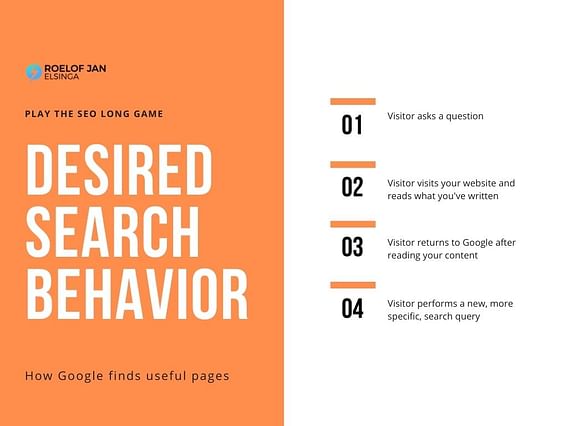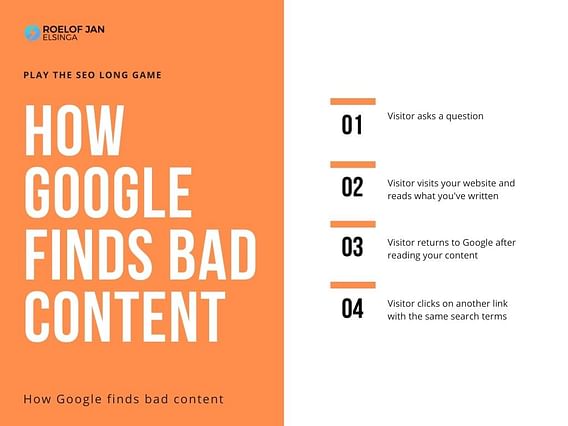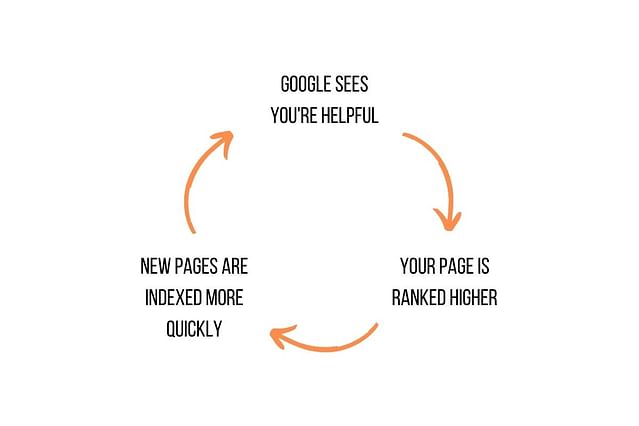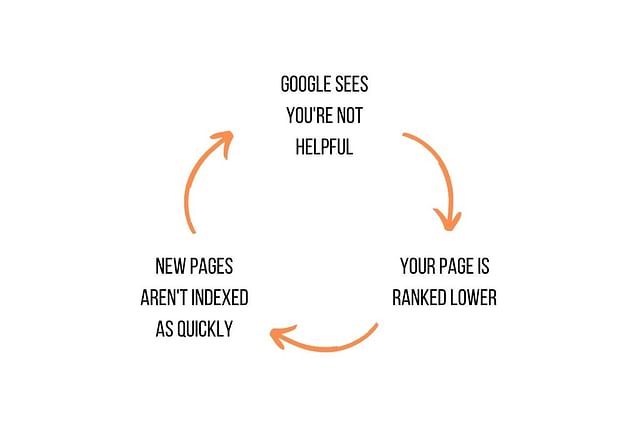 Photo by Melanie Deziel on Unsplash
Photo by Melanie Deziel on Unsplash
Play the SEO long game
If you've felt that your business or website isn't getting the search traffic you think it deserves, you're not alone. Many business owners have this feeling and hire SEO specialists to help them achieve their goals.
However, even with the greatest SEO specialist, it's still a great idea to understand how SEO works and why what you want might not be what's best for your business. Let's explore the benefits of playing the SEO long game and why it might be a much more effective marketing strategy for your business.
Let's skip the SEO hacks, because they're often very expensive and don't benefit you or your business in the long run. Play the long game!
What is the SEO long game?
The SEO long game is simple: You're investing heavily (time, effort, and capital) into making your website as helpful as possible. In practice, this means you're going to have to do 3 things well:
- Explain in very plain, non-jargon, words exactly what it is you do
- Consistently show your expertise to the world by being helpful to your audience
- Have a technically excellent website
This SEO strategy won't be built onto quick SEO wins, but will gift you with exponentially growing traffic as time goes on. I know how vague and frustrating this sounds, there is simply no specific timeline for this strategy. There is no timeline, because Google & friends change their algorithms daily, which can benefit you sooner or make you wait longer.
This SEO strategy is a bit like investing in the stock market: You look at the long-term picture. Google can reward or punish you from day-to-day, but if you keep up this strategy you will have massive long-term benefits.
Enough concepts, let's break down the 3 things that you have to do well to play the SEO long game.
Explain exactly what it is you do
How will people find your business or service if you never explicitly tell your audience what you do? The harsh answer is: they won't find you.
For example, if your business cleans cars and all your website says is "We make your car look like it's brand new", people won't find your business. Your audience will search for terms like "car cleaner near me" or "clean car quickly". A better title/headline would be: We clean your car to make it shine in 15 minutes. Be crystal clear about what it is you do, put it into plain words.
Your website sells your products and/or services, so you should make it very obvious what it is you're selling. You can use all the catchy words you'd like to describe your products or services, but these aren't words your audience will look for. Your audience won't search for "make my car sparkly clean", so think like your audience and use words they would use.
Test yourself
If you can't answer the simple question "How do I help my customer?", you're not ready to optimize your SEO yet. If you don't know how you help your customer, how will they know?
Before you move on to the next step in the SEO long game, you need to have a very clear answer to this question. Your answer should use plain words only and should be a maximum of 2 sentences.
A great way to test your sentences are to tell someone those 2 sentences and then ask them what you do. If they can explain to you what you do, you're ready to move on.
Consistently show your expertise by being helpful
Do you know what Google loves to do? Google loves to help people by answering questions and bringing them to sources that help to answer those questions. Ideally, Google wants to answer these questions as efficiently as possible.
How Google finds helpful pages
Google & Friends love to see user flows where the user goes from a vague idea to a very specific question. When someone goes through this journey, they're learning something new along the way to help them ask better questions. The more specific the question, the better you can help.
This is what Google loves to see:

- Visitor asks a question
- Visitor visits your website and reads what you have to say
- Visitor returns to Google
- Visitor asks a different, more specific, question
This flow of actions means that your website taught the visitor something and helped them to better understand what they really need. Google will now mark this page as useful for the next person to come by.
How Google finds bad content
However, Google also knows if you're not successful in answering the question of this visitor. When you've failed to be helpful to your visitor they will try to learn more on another website.
This is what a non-successful flow looks like:

- Visitor asks a question
- Visitor visits your website and reads what you have to say
- Visitor returns to Google
- Visitor clicks on another link with the same search terms
Apparently the visitor didn't find what they were looking for on your website and tries again with another website. Google now knows that the page wasn't helpful for this search term and will give it less priority next time someone searches that term.
The positive or negative feedback loop
Now we know how Google finds good and bad content and how it ranks these pages, you'll start to see a feedback loop take shape. If you're successful in helping your visitors and Google sees that you're adding value to their search experience, they'll reward you.
If you're consistently helping their algorithm by answering questions, you'll get in a positive feedback loop. This positive feedback loop looks like this:

- Google sees you're helpful to them
- Google ranks your webpage higher in their results
- Your new content will be picked up more quickly, because you were helpful last time
- You get more traffic on existing AND new content
You want your website to get into this positive feedback loop, because it's almost passive marketing. Once the content is out there, you won't have to look at it too much again. You will have to update it if it becomes outdated, otherwise this feedback loop will start to work against you. If your content is outdated, you're no longer helpful and slowly lose the traffic you worked so hard for.
You'll end up in a negative feedback loop. This is what a negative feedback loop looks like:

This negative feedback loops is the best argument that you shouldn't use SEO hacks to help your pages rank. Algorithms change, but great and helpful content performs well and survives algorithm changes more easily.
Have a technically excellent website
Everyone knows Google likes fast websites with a great user experience (UX). That's why business owners often put most of their effort in this part of SEO. You can have the fastest website in the world, but if you're not adding any value to your visitors search experience, you won't grow as fast as you could. Google won't have a good reason to rank your pages, so your audience still won't find you.
Slow websites aren't great for search rankings, but it's not the only factor that goes into great SEO. That said, you should still do everything you can to get a solid base, a fast website. A fast website is always a great thing, but that alone won't sell your products or services.
When you've got the fast website, you can focus on the things that will actually sell your products or services: crystal clear words and showing your expertise. These 2 parts help people find you and help convince them you're the best at what you do and they absolutely need to hire you.
Need help to play the SEO long game?
Do you want to build your own SEO friendly website to grow your business and get the results you want? That's fantastic, you won't be disappointed!
If you're unsure where to start or just want someone to help you achieve your business goals, I'm for hire! You'll get to focus on what you do best: running your business and focus on sales. I will help you to implement the positive feedback loop I've described in this article and lift your website to the next level.
Posted on: December 31st, 2021I streamline your business with software that actually fits the way you work.
Ready to streamline your business? Let’s chat.
